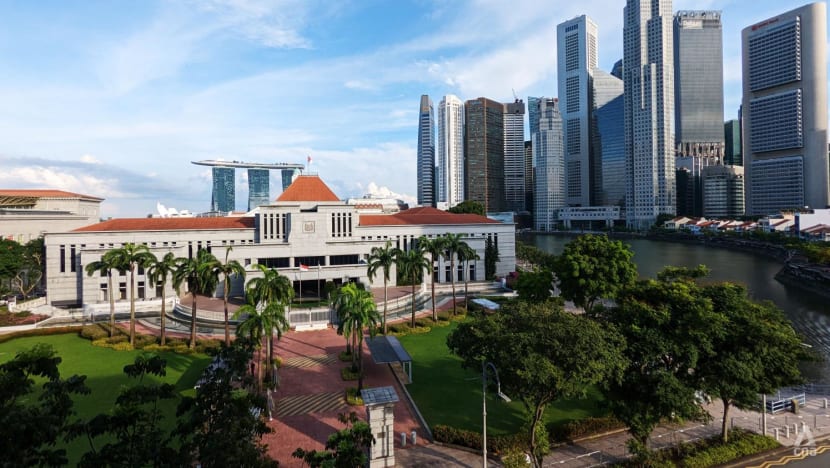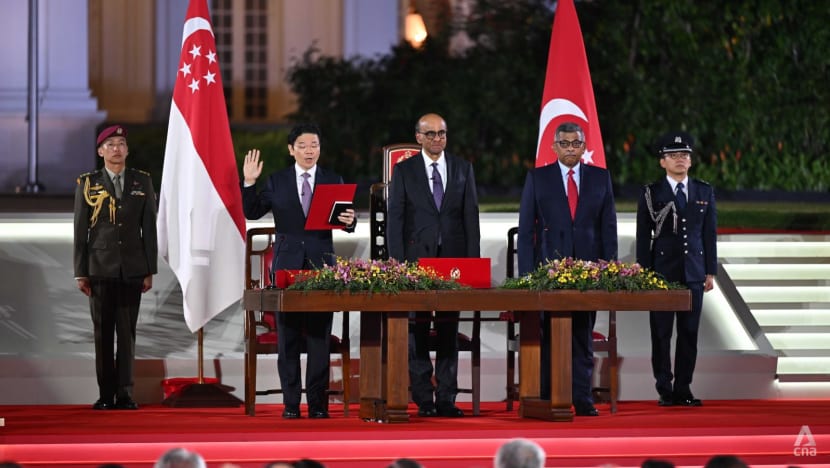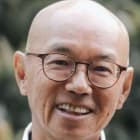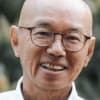Commentary: Singapore risks mediocrity at the top if too few high-calibre people join politics
Founding leader Lee Kuan Yew and his team were so successful, they made redundant the narrative of a vulnerable Singapore that needed the best to serve, says former veteran newspaper editor Han Fook Kwang.

A general view of Parliament House in Singapore on Sep 23, 2022. (File photo: CNA/Try Sutrisno Foo)

This audio is generated by an AI tool.
SINGAPORE: Job vacancy: Looking for successful men and women at the top (or nearly there) of their careers. No prior experience needed but must be committed and passionate about Singapore and have the skills required to plan long term strategies for the country.
Candidates must be able to communicate and connect effectively with ordinary citizens, preferably in two languages.
Those interested only in furthering their own careers need not apply as we’re looking for selfless individuals willing to serve the community.
We offer attractive salaries within a transparent (if controversial) pay scale and the opportunity to rise to the highest office in the land.
Shortlisted candidates will undergo a psychological test and those selected will have to submit themselves to final approval by members of the voting public numbering 20,000 (for a Single-Member Constituency) to 200,000 (for a Group Representation Constituency). If you clear this final hurdle, you will be duly informed of your specific area of responsibility.
Finally, please do not apply personally. We will contact you if we find you suitable (we have our ways).
The ruling People's Action Party (PAP) has obviously not put out such a job advertisement for would-be candidates in the coming General Election (GE) but, in essence, this is how it is seeking to recruit new members to join its leadership ranks.
ENTRENCHED WAY TO ENSURE SUCCESSION
Founding PAP leader Lee Kuan Yew developed the approach in the 1970s and over time it has become entrenched and accepted as the party’s way to ensure succession at the top.
Every government minister since then has been a product of this search and every prime minister has made it his task to beat the same path to look for successors.
In no other country, except perhaps communist China, is the issue of leadership renewal framed in these terms, to be planned and executed in a systematic and formulated way.
In the book Hard Truths To Keep Singapore Going, Mr Lee put it this way:
“If at the core centre quality goes down, then in all the subsidiary organisation quality will also go down. You will no longer inspire … Once you have weak people on top, the whole system goes slowly down. It’s inevitable … Singapore is an 80-storey building on marsh land. We’ve learnt to put in the stakes and floats so we can go up another 20, maybe over a hundred storeys.”
For him, Singapore was not an ordinary country but an exceptional and vulnerable one which had to be constantly tended to keep it ticking.
Without close supervision from the top, how could it sharpen its competitive edge, keep the peace among its multiracial people and protect its interests and security regionally and internationally in a dangerous world?
The questions today are whether such an approach is necessary, whether it still works, what has been the results in recent years and what needs to be done, if any, to change it in response to changing circumstances within Singapore and the world outside.
There are several issues rolled into that one sentence above.
Is Singapore still so vulnerable? Built on marsh land, really?
Does it need such close minding from the top?
How to strike the right balance between a top-down approach and having citizens take greater responsibilities for their own lives?
Each of these deserve a separate commentary to do justice to the importance of the subject.
For the purpose of this piece, I will focus only on the issue of attracting people with ability and commitment into politics.
POTENTIAL MINISTERIAL CANDIDATES IN EVERY GENERAL ELECTION
It is self-evident that any country should benefit from having leaders with the highest ability, greatest commitment and be among the most selfless.
But how to achieve this in a democracy where the people choose their leaders every four to five years?
Add electability to the list of qualities needed, apart from ability, commitment and a sense of public duty.
It has become more difficult to find such men and women and the ruling party has struggled to sell the idea to those it wants to attract, all of them already doing well in their own careers whether in the public or private sector but especially in the latter.
The recent hiccup over leadership succession with Deputy Prime Minister Heng Swee Keat stepping aside after his anointment was announced - paving the way for Prime Minister Lawrence Wong’s appointment - is an early indication that the method is not yielding the same results as before.
Too few people are attracted to politics in safe, secure and prospering Singapore.
Why enter the fray when there seems no pressing need to do so?

The numbers speak for themselves.
Most ministers serve for between 20 and 30 years as an elected Member of Parliament before they retire.
With 19 ministers at present, and assuming the government keeps to roughly this number, the entire Cabinet lineup needs to be renewed every five to six GEs.
This means having at least three potential ministerial candidates in every GE.
The PAP has been unable to achieve this number in the last two GEs. In 2020, only one, Mr Tan See Leng made it to become Manpower Minister, and in the electoral slate in 2015, only Mr Ong Ye Kung and Mr Chee Hong Tat are in the Cabinet.
That’s three out of a required six, or half the target achieved.
If this trend continues in the coming election and the next, the party will be in serious trouble keeping to its self-renewal plan, with troubling implications on the quality of its leadership.
A DOUBLE WHAMMY
More worrying, it is getting harder to attract those from the private sector.
Which high-flying person already doing well in his or her career and looking to climb further up the corporate ladder would want to risk it all by entering politics, with the uncertainty of being elected, the loss of privacy in public office and the increasingly toxic state of social media?
Those diminishing numbers will increasingly come from the public service exacerbating the lack of diversity in Cabinet.It is a double whammy.
Is paying higher salaries the answer?
Mr Lee knew the job of attracting people into politics will become harder and believed that paying ministers more might ease the decision making for some.
So he introduced the ministerial pay formula pegging salary scales to the highest earners in six private sector professions in 1994 in a highly controversial move.
It has become a hot political potato ever since and the government, responding to the backlash, changed the formula in 2012 with lower salaries for all including the Prime Minister and President.
It has also put off increases in ministerial salaries provided for under the revised formula, and, as a result, there has been no revision in the last 12 years.
Given the public mood, it doesn’t seem likely there is much room to move on the pay front.
NEW NARRATIVE NEEDED
What then?
Mr Lee’s approach worked during his time because he was a towering and inspiring figure able to attract people to work with him.
They believed in the cause which was that vulnerable Singapore needed the best to serve or it would perish.
He and his team were so successful, they made the narrative redundant.
A vulnerable Singapore? It might still be, given that it is still a very small country dependent on the outside world, but the people, including elites, no longer hold on to the idea as strongly.
How vulnerable can it be when it is one of the richest countries in the world and first in class in this and that, going by the rankings regularly reported in the media?
This is the crux of the problem.
If vulnerability is no longer the rallying call, what is another compelling idea, as powerful as the old one, to inspire and attract the most able to sign up?
What is it that will move leadership candidates to depart from their chosen path and embark on something totally different?
It cannot just be an economic imperative but has to be much more.
What is it that these people want to do for the country that has not already been achieved?
It calls for a different narrative to the one Mr Lee crafted, one that speaks to today’s generation.
Ultimately, it has to be about what Singapore represents to them that is so irresistible and pressing that stepping forward feels like the right thing to do despite the drawbacks of a political life.
A PROBLEM FOR BOTH RULING PARTY AND OPPOSITION
What might this be?
I do not have the answer but I know that it is exactly what politics is about, which is to persuade you to believe in a future you have not yet envisaged.
Politics has to be made exciting in this sense, not about the self-renewal of any party or to maintain the status quo but creating something new and worthwhile.
This issue applies equally to those who want to join the opposition, not just the ruling party.
It is as hard, if not harder, to persuade people to take on the mantle of a loyal opposition, which means taking on the PAP not for its own sake, but because they believe that it is for the good of the country.
The odds are even greater, the uncertainties more forbidding, and the price of failure even more frightening for aspiring opposition candidates.
Of all the challenges Singapore faces, leadership ranks among the top.
If too few people of high calibre are willing to come forward, Mr Lee’s fear of mediocrity at the top will surely happen.
It is a problem that has to be solved, not just for political parties, but for the country.
Han Fook Kwang was a veteran newspaper editor and is senior fellow at the S Rajaratnam School of International Studies, Nanyang Technological University.













.jpg?itok=ohVS_WhJ)






